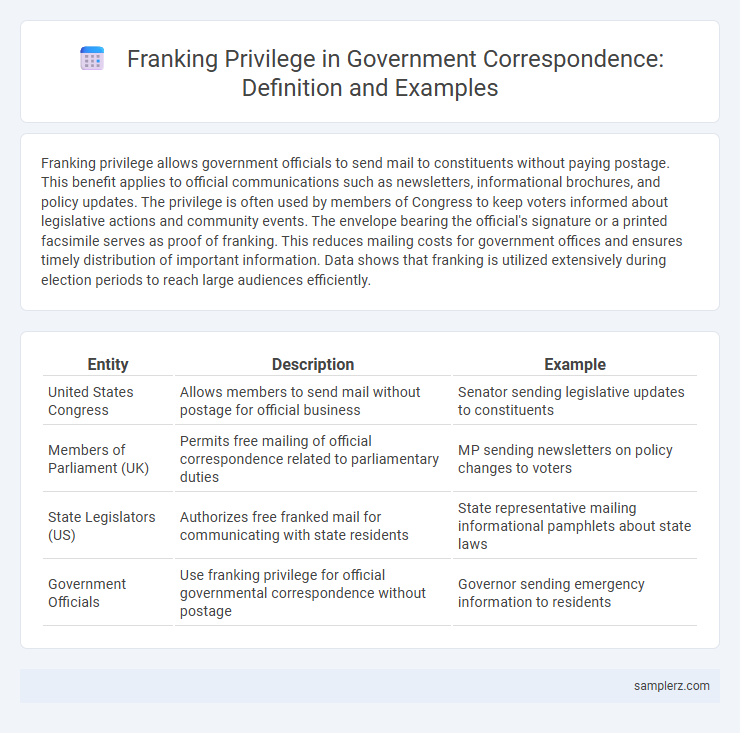Franking privilege allows government officials to send mail to constituents without paying postage. This benefit applies to official communications such as newsletters, informational brochures, and policy updates. The privilege is often used by members of Congress to keep voters informed about legislative actions and community events. The envelope bearing the official's signature or a printed facsimile serves as proof of franking. This reduces mailing costs for government offices and ensures timely distribution of important information. Data shows that franking is utilized extensively during election periods to reach large audiences efficiently.
Table of Comparison
| Entity | Description | Example |
|---|---|---|
| United States Congress | Allows members to send mail without postage for official business | Senator sending legislative updates to constituents |
| Members of Parliament (UK) | Permits free mailing of official correspondence related to parliamentary duties | MP sending newsletters on policy changes to voters |
| State Legislators (US) | Authorizes free franked mail for communicating with state residents | State representative mailing informational pamphlets about state laws |
| Government Officials | Use franking privilege for official governmental correspondence without postage | Governor sending emergency information to residents |
Definition and Historical Background of Franking Privilege
Franking privilege is the government-authorized right allowing elected officials to send mail without postage, using their signature or mark instead. Originating in the British Parliament in the 17th century, it was adopted by the U.S. Congress to facilitate official communication with constituents and reduce mailing costs. Over time, regulations have evolved to prevent abuse while preserving the privilege's role in promoting transparency and civic engagement.
Key Legislation Shaping Franking Privilege
The Postal Reorganization Act of 1970 significantly redefined the franking privilege by limiting and regulating the use of government-funded postal services for official correspondence. Section 3210 of the United States Code further codifies the rules governing the use of franking privileges, ensuring that only authorized governmental communications can be mailed without postage. These legislative measures protect against misuse while facilitating efficient communication between elected officials and their constituents.
Notable Examples of Franking Privilege in Congressional Mail
Notable examples of franking privilege in congressional mail include members of Congress sending official newsletters, constituent updates, and notifications about legislative activities without postage fees. These mailings often highlight key policy positions and district-specific information, ensuring effective communication with constituents while utilizing government resources. Oversight mechanisms are in place to prevent abuse and maintain transparency in the use of franking privileges.
Franking Privilege Usage by Senators and Representatives
Senators and Representatives utilize the franking privilege to send official mail without postage, facilitating communication with constituents on legislative updates and policy issues. This privilege permits them to use their signature or a printed facsimile in place of a postage stamp, significantly reducing mailing costs for government correspondence. Usage of the franking privilege is regulated to prevent misuse, ensuring it supports transparency and effective constituent service.
Franking in Official Constituent Correspondence
Franking privilege allows government officials to send official constituent correspondence without postage, promoting efficient communication between representatives and their constituents. This privilege is used primarily for disseminating information on governmental programs, legislative updates, and public services. Strict regulations ensure that franking is applied only to official business, preventing misuse of government resources.
Distinguishing Official vs. Campaign Use of Franking Privilege
The franking privilege allows government officials to send mail without postage when related to official duties, but it is strictly prohibited for campaign purposes. Official correspondence may include policy updates or constituent services, while campaign materials promoting a candidate or soliciting votes must bear postage. Distinguishing between these uses ensures compliance with regulations and prevents misuse of government resources.
Franking Privilege in Emergency and Crisis Communications
Franking privilege allows government officials to send mail without postage, expediting critical communication during emergencies and crises. This privilege ensures timely dissemination of information such as evacuation orders and public health advisories, enhancing response coordination. Utilizing franking privilege in emergency communications supports effective governance and public safety by removing mailing cost barriers.
Oversight and Regulation of Franking Privilege Examples
Oversight and regulation of the franking privilege ensure that government officials use postage allowances solely for official correspondence, preventing misuse for personal or political campaigns. Examples include audits by the Government Accountability Office (GAO) and strict reporting requirements on congressional mail expenditures. These measures maintain transparency and accountability in the allocation and use of franking privileges.
Controversies Surrounding Abuse of Franking Privilege
The franking privilege allows government officials to send mail without postage, but it has sparked controversies due to potential abuses such as using official resources for personal or campaign-related communications. Investigations have revealed instances where lawmakers allegedly exploited franking for political gain, raising ethical concerns and calls for stricter regulations. Efforts to curb abuse include stricter oversight by the Postal Regulatory Commission and legislative proposals aimed at enhancing transparency and accountability.
Modern Adaptations of Franking Privilege in Digital Communication
Modern adaptations of franking privilege in government correspondence include the use of secure digital signatures and authorized email domains to ensure official communications remain postage-free. Agencies employ encrypted mailing systems that authenticate sender identity while preserving taxpayer-funded mailing privileges. These digital methods maintain transparency and efficiency in constituent outreach without incurring traditional postal costs.

example of franking privilege in correspondence Infographic
 samplerz.com
samplerz.com